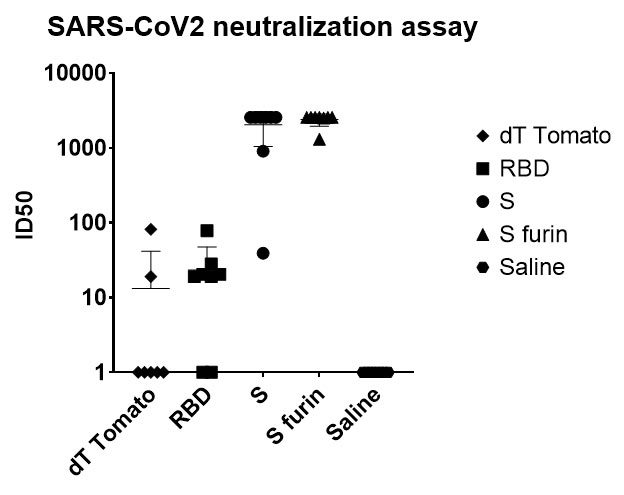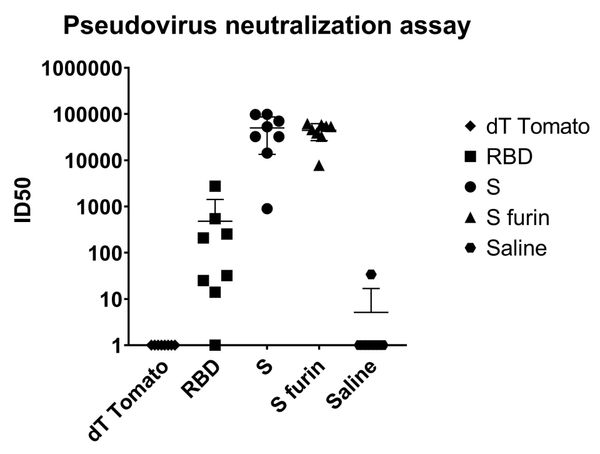
Providence Therapeutics Reports Supportive Preclinical Data for its COVID-19 Vaccine Candidate (PTX-COVID19-B)
Data provides evidence of strong SARS-CoV-2 neutralization
Neutralization titers confirmed in blinded studies performed by two researchers using both a clinical isolate of SARS-COV-2 and pseudotyped SARS-COV-2
August 5, 2020, at 8.00 AM EDT — Toronto, Ontario - Providence Therapeutics Holdings Inc., Canada’s leading mRNA vaccine company, today announced compelling preclinical data in their development of a novel mRNA vaccine for COVID-19. Based on what we expected to find for patients who have been infected with the virus and have recovered, we’re seeing materially higher neutralizing antibody responses. The results demonstrate strong antibody responses against the spike (S) protein that were highly effective at neutralizing the virus in multiple assays. These responses were accompanied by T cell responses, indicating possible long-lasting immunity. The release of this data puts Providence Therapeutics on track for human vaccine clinical trials in Canada later this year.
Preclinical studies supporting robust immunogenicity of PTX-COVID19-B were carried out at the University of Toronto. Serum neutralization titers were evaluated independently in blinded studies by the groups of Dr. Mario Ostrowski, and Dr. Anne-Claude Gingras. Results from wild type SARS-CoV-2 and pseudotyped virus-based assays independently verified that PTX-COVID19-B induced robust neutralizing titers.
“My lab has been working closely with Providence Therapeutics on potential COVID-19 vaccines using their mRNA technology. The results coming from our first animal experiment showed that the vaccines are resulting in a strong immune response,” said Dr. Ostrowski. “In particular, the vaccine against the S protein produced neutralizing antibodies at higher titers than the results announced by other mRNA vaccine manufacturers. I am very excited to continue work on the vaccine and help to push it into clinical trials in collaboration with Providence.”
Eric Marcusson, Ph.D., Chief Scientific Officer of Providence Therapeutics, stated “I would gladly test our vaccine head-to-head against any out there. It is always difficult to compare preclinical results, however, I believe our results compare extremely favourably to preclinical results reported by other companies.
Brad Sorenson, President & CEO of Providence added, “It is tremendously satisfying to see the hard work of so many dedicated employees and collaborators coming together to produce a world-class vaccine right here in Canada. Now we reiterate our request to governments in Canada to support us as we move forward quickly into human trials.”
Background
Providence Therapeutics evaluated three mRNA vaccine candidates for SARS-CoV-2. The study was designed to evaluate the immunogenicity and generation of neutralizing antibodies to SARS-CoV-2 of three mRNA vaccine candidates injected intramuscularly (IM) into C57BL/6 mice. The live phase of the study, as well as the T cell and clinical isolate neutralization assays, were run in the laboratory of Dr. Mario Ostrowski at the University of Toronto and the antibody binding assays and pseudovirus neutralization assays were run in the laboratory of Dr. Anne-Claude Gingras at Mount Sinai Hospital, Toronto.
Mice were dosed with either mRNAs encoding the receptor-binding domain (RBD) or two different full-length versions of the Spike (S) protein (one with a mutated furin-cleavage site). Control groups were dosed with an mRNA encoding a fluorescent protein (tdTomato) or saline. The mice were dosed at 20µg twice (three weeks apart) via IM injection. No adverse effects were observed. Three weeks after the second vaccine injection, all mice were euthanized and blood and spleen cells were harvested. All three vaccinated groups of mice had positive interferon-gamma producing spleen cells when evaluated by ELISpot assay with an S protein library (focused mainly on the RBD region) demonstrating the ability to elicit a T cell response. In order to determine the levels of neutralizing antibodies in the sera, two different neutralization assays were performed in a blinded fashion.
A strain isolated from a Canadian COVID-19 patient was used to infect Vero-E6 cells. Sera from individual animals was serially diluted starting at 1:20 and going in two-fold steps to 1:2560. Sera from mice immunized with either one of the S protein candidates showed extremely strong neutralization activity. In fact, even at the highest dilution tested (1:2560) 6 or 7 of the 8 mice in each group showed 100% neutralization (Figure 1). Therefore, an exact neutralization titer (the dilution at which 50% of the virus can be neutralized) for these two groups could not be determined, but it is >1:2560, RBD immunized group showed only moderate neutralizing activity. Similarly, when the neutralization assay was performed using a pseudovirus (lentivirus expressing the SARS-CoV-2 S protein), the sera from groups of S protein immunized mice had extrapolated IC50 of 50,000 and 45,000. This assay has a readout from a luminometer, it is more quantitative and sensitive (dilutions went up to 1:24,400). Control groups sera had no neutralization activity.
These assays were developed to test COVID-19 patients’ sera and for comparison purposes, in the clinical isolate neutralization assay sera from approximately 30 convalescent patients tested to date have titers between 80-320. Also, sera from 50 convalescent patients tested with the pseudovirus assay have an average titer of ~1:500 and the highest samples have a titer of ~1:10,000.

Figure 1 Neutralization titers from the wild-type virus assay:
In this particular cell-based assay, the maximum value obtainable in this assay was 1:2560 which is the top dilution in the series. This value was obtained from the samples of 6 or 7 out of the 8 mice treated in both the S and S furin groups so the reported titers are a minimum of actual titers.

Figure 2 Neutralization titers from the pseudovirus assay:
This assay is more quantitative as it is run on a luminometer. The top dilution in this assay was 24,400 and many samples were saturating the assay at that dilution. However, because of the quantitative nature of the assay, values higher than 24,200 could be extrapolated.
There are a number of important factors that could cause the Emergent’s actual results to differ materially from those indicated by such forward-looking statements, including, but not limited to, the success of the planned development program, the timing of and ability to obtain and maintain regulatory approvals or authorization for emergency or broader patient use for the product candidate and Emergent’s manufacturing capabilities. The foregoing sets forth many, but not all, of the factors that could cause actual results to differ from expectations in any forward-looking statement. The reader should consider this cautionary statement, as well as the risk factors identified in Emergent’ periodic reports filed with the SEC, when evaluating Emergent’s forward-looking statements.
About Providence Therapeutics
Providence Therapeutics is Canada’s leading mRNA vaccine company. In response to a worldwide need for a COVID-19 vaccine, Providence has expanded its focus beyond oncology and devoted its, energy and resources to develop a mRNA vaccine for COVID-19. Providence Therapeutics is focused on serving the needs of Canada, and other countries that may be underserved by large pharma programs. For more information, please visit www.providencetherapeutics.com.
Contact
For further information/Media contact:
Andrea Chrysanthou
Director, Communications
Global Public Affairs
Mobile: 416-797-8194
Direct: 416-597-3486
